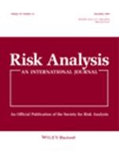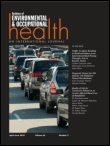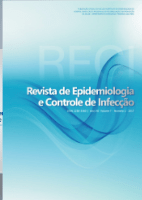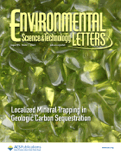
Revista de Salud Ambiental
Scope & Guideline
Empowering Research, Enhancing Public Health
Introduction
Aims and Scopes
- Environmental Health Assessment:
The journal emphasizes methodologies for assessing environmental health risks, including air and water quality evaluations, biocidal risk assessments, and the monitoring of vector-borne diseases. - Interdisciplinary Research:
It promotes interdisciplinary research integrating fields such as public health, ecology, urban planning, and social sciences to address complex environmental health issues. - Innovative Technologies and Approaches:
The journal showcases innovative technologies and approaches in environmental health, such as genomic sequencing, GIS applications, and new biocidal alternatives, aimed at improving public health outcomes. - One Health Perspective:
There is a consistent focus on the One Health approach, which recognizes the interconnectedness of human, animal, and environmental health, particularly in addressing zoonotic diseases and antimicrobial resistance. - Public Engagement and Policy Impact:
The journal aims to foster citizen participation and inform policy through research findings, highlighting the role of community engagement in environmental health initiatives.
Trending and Emerging
- Microplastics and Human Health:
There is a significant increase in research related to the impacts of microplastics on human health, reflecting growing global concern over plastic pollution and its environmental consequences. - Climate Change and Health:
Emerging studies on the intersection of climate change and public health highlight the urgency of adapting health systems to mitigate the effects of climate variability on human health. - One Health Approach to Disease Management:
The One Health framework is increasingly prevalent, emphasizing the need for interdisciplinary collaboration to tackle zoonotic diseases and promote health across human, animal, and environmental domains. - Technological Innovations in Environmental Health:
Research focusing on innovative technologies, such as genomic sequencing and digital health tools for monitoring environmental risks, has gained prominence, reflecting a trend towards data-driven public health strategies. - Social Determinants of Health:
There is a growing emphasis on understanding the socio-environmental factors influencing health disparities, particularly in vulnerable populations, which aligns with broader public health goals of equity and access.
Declining or Waning
- Traditional Vector Control Methods:
Research on conventional vector control strategies has decreased, possibly due to a shift towards innovative and integrated pest management approaches that consider ecological impacts and sustainability. - Indoor Air Quality Studies:
Although indoor air quality remains important, studies specific to traditional pollutants have waned in favor of broader investigations into climate change impacts and their implications for public health. - Agricultural Pesticide Impact Studies:
Research specifically focused on the health impacts of traditional agricultural pesticides has lessened, likely due to growing interest in biocontrol methods and the ecological consequences of pesticide use. - Legionella Research Focus:
Studies specifically targeting Legionella and its control measures have become less frequent, indicating a potential shift towards a more holistic approach to waterborne diseases and environmental monitoring.
Similar Journals

Revista Internacional de Contaminacion Ambiental
Connecting Research with Real-World Environmental SolutionsWelcome to the Revista Internacional de Contaminación Ambiental, a reputable journal dedicated to the field of environmental science, specifically focusing on pollution and waste management. Published by CENTRO CIENCIAS ATMOSFERA UNAM in Mexico, this journal has been a vital platform for scientific discourse since its inception in 1996 and continues to thrive as it converges into 2024. The journal holds a position in Quartile 4 for both Pollution and Waste Management in the 2023 rankings, as well as a Scopus rank in the environmental sciences category, reflecting its commitment to addressing urgent environmental issues. Although not an open-access publication, its meticulous contributions are crucial for researchers, professionals, and students alike, offering insights into pressing environmental challenges and innovative solutions. The Revista Internacional de Contaminación Ambiental is an essential resource for anyone engaged in the study and application of environmental protection and sustainable waste management.

RISK ANALYSIS
Elevating Standards in Risk Analysis and ManagementRISK ANALYSIS is a premier journal published by Wiley, focusing on the critical intersection of safety, risk, reliability, and quality within the fields of engineering and physiology. With a strong standing reflected in its Q1 category ranking in Safety, Risk, Reliability and Quality and Q2 in Physiology (medical), this journal is a vital resource for researchers, professionals, and students eager to stay informed on the latest methodologies, theories, and applications surrounding risk assessment and management. Since its inception in 1981, RISK ANALYSIS has been instrumental in shaping the discourse in its fields, garnering a robust reputation verified by its high rankings on Scopus, where it is positioned in the 85th percentile in Safety and the 77th percentile in Medicine. Though it does not currently offer Open Access options, the journal remains essential for those committed to advancing their understanding of risks associated with complex systems. For more insights, RISK ANALYSIS is available to readers throughout its converged years extending to 2024, solidifying its role as a foundational journal for impactful research.

INTERNATIONAL ARCHIVES OF OCCUPATIONAL AND ENVIRONMENTAL HEALTH
Elevating Standards in Occupational and Environmental HealthINTERNATIONAL ARCHIVES OF OCCUPATIONAL AND ENVIRONMENTAL HEALTH is a prestigious journal published by Springer that serves as a vital resource in the field of public health and occupational safety. With its ISSN 0340-0131 and E-ISSN 1432-1246, this journal has been a cornerstone for researchers and professionals since its inception in 1975, converging knowledge and insights to enhance health practices and policies. Rated in the top Q1 category for both Public Health and Environmental and Occupational Health as of 2023, it currently ranks 154 out of 665 in Scopus, placing it in the 76th percentile, underscoring its significant impact within the scientific community. Although the journal does not offer open access, it provides invaluable content covering various aspects of environmental health, occupational safety, and epidemiological studies, making it a must-read for anyone vested in improving health outcomes across diverse populations. Located in Germany with an office at One New York Plaza, Suite 4600, New York, NY 10004, United States, the journal is committed to advancing knowledge and fostering collaboration among its readership.

IJID Regions
Fostering collaboration in the fight against infectious diseases.IJID Regions is a pioneering open access journal published by Elsevier, focusing on the critical fields of epidemiology, infectious diseases, and public health. Established in 2021, the journal aims to provide a platform for disseminating high-quality, innovative research that addresses pressing health issues and informs evidence-based practices in communities around the globe. With its impact factors reflecting a Tier Q2 and Q3 ranking in various medical subcategories on the Scopus platform, IJID Regions is positioned as a valuable resource for researchers, health professionals, and policy-makers striving to enhance public health outcomes. This journal not only champions open access since its inception, promoting the free flow of information, but also welcomes contributions that shed light on contemporary challenges in environmental and occupational health. Its commitment to fostering dialogue and collaboration in the health sciences is paramount, making it an essential read for those engaged in advancing public health knowledge and initiatives.

Archives of Environmental & Occupational Health
Fostering collaboration for a sustainable future in health.Archives of Environmental & Occupational Health is a prestigious journal published by Routledge Journals, Taylor & Francis Ltd, dedicated to advancing research and knowledge in the realms of environmental science, occupational health, and toxicology. With an ISSN of 1933-8244 and an E-ISSN of 2154-4700, this peer-reviewed journal has gained significant recognition, currently holding a Q2 ranking in Environmental Science and Q3 rankings in Health, Toxicology and Mutagenesis, and Public Health. Established in 2005, it serves as a vital platform for researchers, practitioners, and policymakers alike who aim to address and disseminate findings on pressing environmental and occupational health issues. The journal is not open access, allowing for rigorous peer review processes while still reaching a broad readership. As it converges through 2024, the Archives of Environmental & Occupational Health continues to play a critical role in shaping discourse and fostering innovation in the field, making it an essential resource for those committed to improving both human health and the environment.

Pollution
Championing the fight against pollution through knowledge.Pollution is a distinguished open-access journal published by UNIV TEHRAN, dedicated to advancing the understanding of environmental science and the multifaceted aspects of pollution research. Since its establishment in 2015, the journal has been committed to disseminating high-quality, peer-reviewed articles that address the pressing issues of environmental degradation globally. With an impact factor and a Scopus rank that places it within the top tier of Environmental Science (Rank #141/233), Pollution serves as an essential resource for researchers, professionals, and students alike. The journal encompasses a wide range of topics, including the sources, effects, and mitigation strategies related to various forms of pollution, thereby aiming to contribute significantly to the scientific community's efforts in promoting environmental sustainability. Its innovative and timely approach positions Pollution as a vital platform for sharing knowledge and fostering interdisciplinary collaboration in the environmental science domain.

ACS Environmental Au
Empowering Global Discourse on Environmental ChallengesACS Environmental Au is a leading open-access journal published by the American Chemical Society (ACS), dedicated to advancing research in the environmental sciences. Since its inception in 2021, this journal has quickly established itself in the highly competitive landscape of environmental research, achieving Q1 status across multiple categories—Environmental Engineering, Environmental Science (Miscellaneous), and Water Science and Technology. With a strong Scopus ranking, including Rank #38 in Water Science and Technology representing the top 85th percentile, ACS Environmental Au serves as a vital platform for disseminating high-quality research and innovative solutions to pressing environmental challenges. It is particularly notable for its commitment to accessibility, providing researchers, professionals, and students with open access to critical findings that support sustainable development and environmental stewardship. This journal not only emphasizes rigorous scientific inquiry but also seeks to provoke thoughtful discourse and collaborative initiatives that address global environmental issues.

Biosafety and Health
Innovating solutions for a safer, healthier world.Biosafety and Health is a leading peer-reviewed journal published by ELSEVIER, dedicated to advancing knowledge and practice in the fields of biotechnology, infectious diseases, microbiology, and public health. With an ISSN of 2096-6962 and an E-ISSN of 2590-0536, this Open Access journal has been accessible to the global research community since 2019, fostering collaboration and innovation from its base in the Netherlands. Ranked Q2 in multiple categories according to the latest metrics, including Biotechnology and Microbiology (medical), it stands as a testament to high-quality, impactful research that influences clinical and environmental practices. The journal has achieved substantial recognition in various medical fields, ranking in the 88th percentile for Public Health, Environmental and Occupational Health, and the 78th percentile for Infectious Diseases. Researchers and practitioners seeking to contribute to this evolving domain are encouraged to submit their findings, as the journal aims to promote interdisciplinary dialogue and address pressing global health challenges.

Revista de Epidemiologia e Controle de Infeccao
Connecting Scholars and Practitioners in EpidemiologyRevista de Epidemiologia e Controle de Infeccao, published by Universidade de Santa Cruz do Sul, stands as a vital resource for scholars and practitioners in the fields of epidemiology and infection control. This open-access journal, available since 2011, fosters the dissemination of high-quality research and practice-based knowledge aimed at enhancing public health and improving infection management strategies. With its commitment to sharing invaluable insights from Brazil and beyond, the journal encourages broader participation in critical discussions surrounding infectious diseases. Although specific metrics such as the HIndex and Scopus rankings are currently omitted, the journal's relevance is underscored by its open accessibility, allowing a global audience of researchers, healthcare professionals, and students to engage with innovative studies and findings in this essential area of public health.

Environmental Science & Technology Letters
Leading the charge in ecological innovation and sustainability.Environmental Science & Technology Letters, published by the American Chemical Society, stands as a premier journal in the realm of environmental science and technology, focusing on pivotal studies that address pressing environmental challenges. With an impressive Q1 ranking in multiple categories including Ecology, Environmental Chemistry, and Pollution, this journal maintains a position of excellence within its field, achieving Scopus ranks that place it in the top percentile of Environmental Science disciplines. Although not open access, Environmental Science & Technology Letters offers vital insights and cutting-edge research that contribute significantly to the understanding and management of environmental issues. The journal’s objectives include disseminating ground-breaking findings and promoting discussions that lead to sustainable solutions. With convergence from 2013 to 2024, it continues to serve as an essential resource for researchers, professionals, and students committed to advancing knowledge and innovation in environmental science.